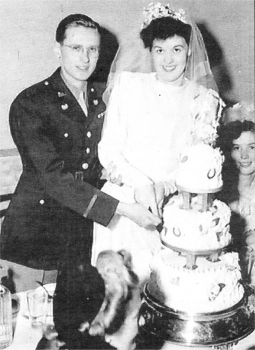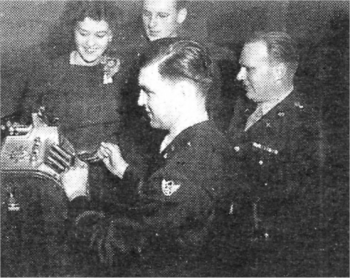
The Yank who won his Glenavy girl
The Digger recalls a wartime romance at Langford Lodge
 |
| Newly weds Myrtle and Richard Neff cut their wedding cake |
THE Protestant Hall in Glenavy was just one of many focal points during the Second World War where people would meet for social gatherings and soirees in the district. Myrtle Armstrong and her sister Patricia were no exception. Their father, Thomas, had been the local railway stationmaster, since the arrival of the family in the village in 1940 and Myrtle recalls one evening they attended a dance in the hall. The music was provided by a local pianist and fiddler, and usually went onto into "the small hours." The American soldiers had arrived in the area, and that evening two visited the hall. They were passing on their bicycles, heard the music and decided to investigate. To Myrtle's horror the Americans made their way over to her and her sister. Myrtle can still recall saying to her sister "Oh no, you know those two yankees that came in, they're coming our way."
The stern warnings from their parents had some effect on the sisters and they refused the gentlemen's offer of walking them home after the dance. They were well aware the music they would have to face at home for disobedience would not be on the same scale as the music they had been dancing to!
On return from school the next day, Myrtle recalls the wonderful cooking smells emanating from her mother's kitchen. She was met by her mother, enveloped in her apron and covered with flour at their front door. "What have you been up to?" her mother asked.
Her sister, Patricia, tried to intervene and instructed Myrtle to inform their mother they hadn't been doing anything but the story slowly began to unfold, and Myrtle realised that earlier that day a young American had driven to the house while the girls were at school. and delivered a sack of flour, sugar and 5lbs of hard Christmas candy, leaving instructions it was a present for her daughters. This was wartime and never before during this period had the girls ever seen any of these luxuries in such quantities.
 Susan Armstrong certainly wasn't
complaining, but she was uncertain as to her daughters' role
in the events prior to the acquisition. Myrtle
and her sister had unwittingly been in the company of the
man in charge of the quartermasters stores on the American
base. That first encounter by Myrtle with the Americans
would not be the last. In the latter part of 1942 Myrtle
heard from a friend the American's were hiring locals for
office work at Langford Lodge and offering good money. They
obtained the name of an officer on the base and decided to
set out on their bicycles. Myrtle recalls the heavy rain
that had fallen and can remember vividly the ankle deep mud
in the vicinity of the construction site at the lodge.
Myrtle and her friend were interviewed by "a charming
fatherly Colonel" and instantly hired.
Susan Armstrong certainly wasn't
complaining, but she was uncertain as to her daughters' role
in the events prior to the acquisition. Myrtle
and her sister had unwittingly been in the company of the
man in charge of the quartermasters stores on the American
base. That first encounter by Myrtle with the Americans
would not be the last. In the latter part of 1942 Myrtle
heard from a friend the American's were hiring locals for
office work at Langford Lodge and offering good money. They
obtained the name of an officer on the base and decided to
set out on their bicycles. Myrtle recalls the heavy rain
that had fallen and can remember vividly the ankle deep mud
in the vicinity of the construction site at the lodge.
Myrtle and her friend were interviewed by "a charming
fatherly Colonel" and instantly hired.
Within minutes they were introduced to their new bosses. Myrtle recalls the first time she set eyes on her new boss. "A tall skinny GI came in, picked up my application and glanced down at me and muttered 'Myrtle...e'gads... His comments somewhat displeased Myrtle and she recalls how the blood rushed to her cheek, she felt her temper rise and jumped to her feet. The GI stepped back a little, grinned, shook hands and introduced himself. "I'm Richard Neff, better known as Dick, we will be working together, follow me." Myrtle was unimpressed and could never have guessed that she would spend the next 60 years of her life with this man.
Myrtle started work at the base, riding on her bicycle every day from Glenavy. Eventually the base provided a car and driver to taxi Myrtle and other local girls to and from work. This lifestyle was in stark contrast to what Myrtle and her friends had known before.
Myrtle attended her first Christmas Ball in Langford Lodge in 1942. She describes it as a lavish affair for a "little Irish girl who had known only war time fare." GI's dressed in white jackets and a punch bowl nestled in the well of the beautiful staircase are some of the treasured memories of that evening.
The following summer, Richard asked Myrtle to have dinner with him. They had worked amicably together as boss and secretary to this point.
Security was paramount during the war, and the military personnel were not permitted to divulge any information as to their whereabouts or their duties, to the point that Richard's mother did not even know his location. Richard asked Myrtle if she could write to his parents on his behalf. They knew Myrtle's correspondence would not be as heavily censored. It was the first time Richard's parents knew he was in Ireland.
In late 1944, Richard asked Myrtle to marry him and an acceptance was readily forthcoming. The long drawn out procedures for obtaining permission to wed, the investigations and interviews by British and American security agencies and the concerns of her mother only made Myrtle more determined to go through with a wedding.
In 1942 Ernest Brown, Minister of Health was reminded in the House of Commons by Lt Col Wickham that all registers of marriages and womens' organisations were aware that no American Military personnel on duty in a foreign country may marry without written permission, and even if that permission were given, marriage allowance would not be payable, nor would the wife become a U.S. citizen or be allowed to accompany her husband on return to the United
States. The Lt Col said he wanted "to ensure our girls know exactly what their position is before embarking on a course that will affect the whole of their future." Richard had been best man on the 2nd March 1944 at the wedding of his colleague and friend Fred Tron to Finaghy girl Daphne Holdsworth. Fred would return the favour for Richard and was bestman at Richard and Myrtle's wedding in Seymour Street Methodist Church on 25th January 1945.
Myrtle recalls the terrible weather. The church pipes had frozen and she had to wear a wool sweater underneath her wedding gown. The material for the wedding gown had been obtained from coupon books that in turn had been purchased from the winnings of a shilling slot machine at Langford Lodge. Myrtle's mother had made the wedding cake and the cook at the base ----------ced and orange ,sson were provided by a good friend of Myrtle's mother.
Life for Myrtle had changed forever. She was about to venture on a journey to the land of "milk and honey".
Next: Aboard a G.I. Bride Ship. The Digger can be contacted at Ulster Star Office or by email: diggerarticle@hotmail.com.
Visit the Diggers new web site www.glenavyhistory.com
05/09/2008
